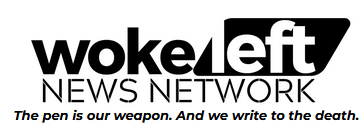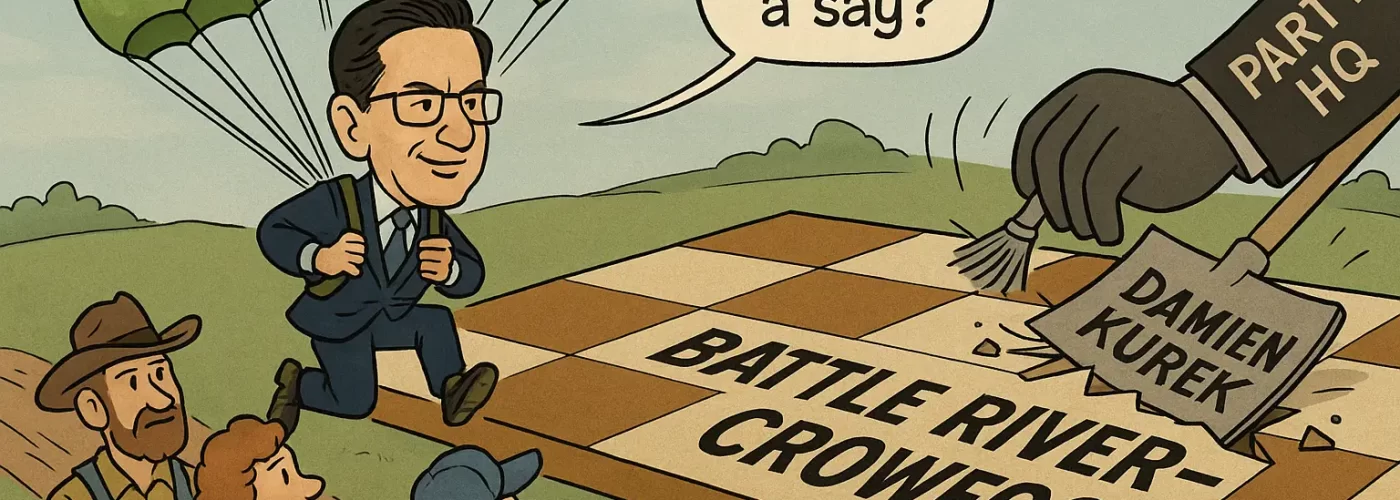In 2019 Damien Kurek was elected to serve Battle River–Crowfoot by people who knew him—people who trusted him to carry their concerns from small-town Alberta to the halls of Ottawa.
The trust in him shown by his community is what makes his offer to step aside for Pierre Poilievre so unsettling.
On April 28, 2025, Kurek was re-elected with almost 82% of the vote, one of the highest Conservative voting margins in the country. He didn’t squeak by – he earned his place. And now he’s offering to give it up because the Conservative Party decided its leader needed a safe seat, made into a safe stronghold by the efforts of Damien Kurek, not Pierre Poilievre.
What Does Damien Kurek Get in Return?
Having served 5 ½ years as MP for Battle River–Crowfoot, Kurek was just months away from qualifying for a federal pension. So far, we’ve heard no other explanation for Kurek’s offer to step down other than his desire to help Poilievre. But stepping aside for a party leader who has just lost his own riding isn’t something done casually. If you’re giving up a seat you won by a landslide, there’s probably a plan. Is he being promised another political role? A policy position? A future Senate seat? We don’t know. But this kind of move typically comes with strings—career trajectories, loyalty trades, and rewards.
And that’s a problem. Voters sent Kurek to Ottawa to represent them, not to make backroom deals to protect party leadership. The riding didn’t initiate his departure, and yet, it’s the people of Battle River–Crowfoot who are expected to quietly accept the outcome.
What Happens if Poilievre Wins the by-election?
Let’s assume Pierre Poilievre wins the by-election. Given that Mark Carney has just formed government, we are likely at the beginning of a full mandate. That means the people of Battle River–Crowfoot could be represented by Poilievre for the next four years. And if he becomes Prime Minister, maybe even longer. This is not a short-term favour. It’s a long-term commitment.
Interviews with locals seem to indicate that many people in Battle River–Crowfoot are open to the idea of having Poilievre as their MP. Some hope his national profile will bring more attention and even more services to the region. But anyone who’s watched federal politics knows that national leaders don’t have time to attend local meetings or answer regional calls. They don’t show up at community fairs or sit down with municipal leaders to hash out rural broadband expansion or grain rail logistics. It’s not a character flaw; it’s reality. We’ve already seen the lack of time Poilievre had for Carleton.
So while Battle River–Crowfoot may technically have an MP, it’s highly unlikely they’ll have an accessible one. And that’s a loss for people who are used to being heard.
Is This Ethical?
Though this has been done before for other party leaders, this whole move feels murky.
The people of Battle River–Crowfoot voted for a man with deep roots in their region. A fifth-generation farmer. Someone who lived and breathed the life they understood. Someone who showed up, listened and responded.
That’s what made him effective and trustworthy.
To offer up his seat, without consultation, or even a public acknowledgment of the implications for the riding, feels like a swindle.
Poilievre has the right to run, but parachuting into a riding over 3,000 km away, where he’s never lived or worked, expecting voters to rubber-stamp your presence, is nothing more than political expediency. Instead of a move meant to serve the community, this plays out like a chess game, moving the pieces to keep power.
A Reward or a Trade-Off?
It’s fair to ask: Will the Battle River–Crowfoot riding benefit from having the Conservative leader as their MP? On paper, having Pierre Poilievre as your MP might seem like an upgrade; a chance to be front and centre in national politics, perhaps even in line for special attention or investment.
But that’s not likely to be the way this plays out.
Once party leaders enter Parliament, especially those with ambitions to become Prime Minister, their role as local MPs becomes more symbolic than practical. They spend their time in Ottawa or touring the country, not holding town halls or listening to concerns about local hospital closures. Their attention is national, their schedule full, and their local presence minimal.
Even if Poilievre were to win the seat and become Prime Minister, that doesn’t guarantee Battle River–Crowfoot would see more funding or federal support. In fact, rural ridings with high loyalty are often taken for granted, not rewarded. There’s less incentive to fight for resources in areas the party already expects to win.
And Poilievre’s record doesn’t suggest a particular connection with rural Alberta. He hasn’t led on agriculture. He hasn’t pushed for farm policy. He hasn’t shown up for the issues this region lives with daily, like rail access, broadband, crop insurance, or rural ER closures.
By contrast, Damien Kurek advocated for issues that mattered in the region, like the carbon tax on farm fuels, broadband expansion, and emergency services funding.
If Poilievre takes the seat, the riding might gain a headline. But it loses a champion.
They Still Have a Choice
Voters in Battle River–Crowfoot are not powerless.
In the coming by-election, they will have a decision to make. Some may vote for Poilievre out of party loyalty. Others may sit this one out—an act of protest in itself. And some may look at alternatives like Brent Sutton, the local Liberal candidate, who has spoken openly about restoring respect in politics and representing rural voices without parachutes or party games. A new Independent candidate, Sarah Spanier, is offering a non-partisan option for voters who want to send a message without aligning with a major party.
Final Thoughts
There are plenty of good people in politics. Damien Kurek may well be one of them. But stepping aside like this, without voter input, undermines everything he seems to stand for.
It also hands Pierre Poilievre an opportunity he didn’t earn, and that’s not how representation should work.
If we’re going to defend democracy—rural, urban, or anywhere in between—we have to start by defending the right of voters to choose their own voice. Not to have it replaced, assumed, or handed over for convenience.
Battle River–Crowfoot deserves better.
Not because the riding is special.
But because every riding is.


